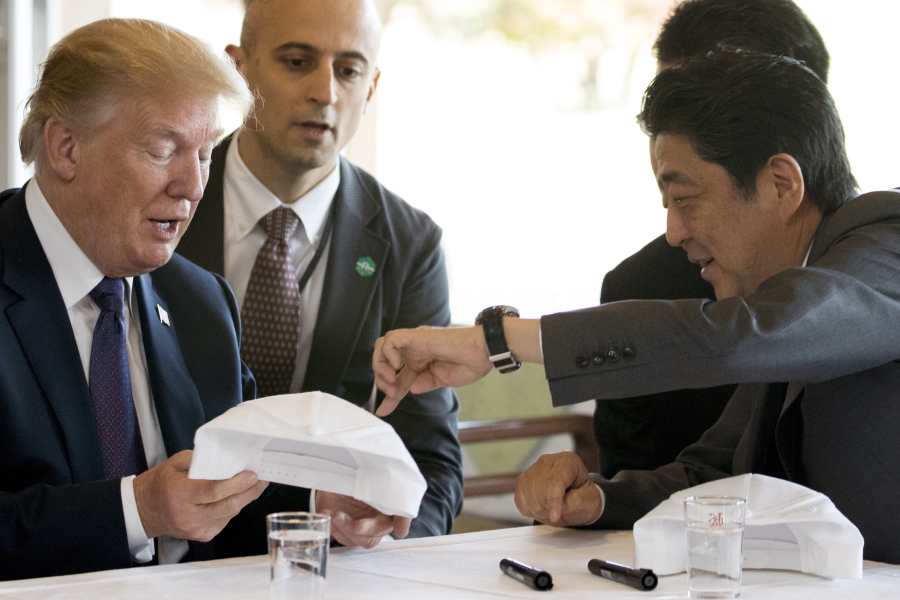TOKYO — After easing into his Asian debut with golf and a taste of home, President Donald Trump is trying to put a human face on North Korea’s menace, hearing from anguished families of Japanese citizens snatched by Pyongyang’s agents.
Trump’s meeting Monday promises to elevate these heart-wrenching tales of loss to the international stage as he hopes to pressure North Korea to end its provocative behavior toward American allies in the region.
North Korea has acknowledged apprehending 13 Japanese in the 1970s and 1980s, but claims all those captives have died or been released. But in Japan, where grieving relatives of the abducted have become a symbol of heartbreak on the scale of American POW families, the government insists nearly 50 people were taken — and believes some may be alive.
Trump has delivered harsh denunciations of the renegade North Korean leader Kim Jong Un, belittling him as “Little Rocket Man” and threatening to rain “fire and fury” on his country if the belligerence continues. But Trump also has begun highlighting the plight of the North Koreans.
“I think they’re great people. They’re industrious. They’re warm, much warmer than the world really knows or understands,” Trump told reporters on Air Force One while flying to Japan on Sunday. “And I hope it all works out for everybody.”
Also on the agenda during Trump’s second day in Asia: an audience with Emperor Akihito, a sit-down with Prime Minister Shinzo Abe and a state dinner.
North Korea is the critical issue looming over Trump’s 12-day, five-country trip that will include direct talks with Trump’s Chinese and Russian counterparts.
In Washington, a new analysis emerged from the Pentagon saying that a ground invasion of North Korea is the only way to locate and destroy, with complete certainty, all components of Kim’s nuclear weapons program.
“It is the most bleak assessment,” said U.S. Sen. Dianne Feinstein, a member of the Senate Intelligence Committee.
Two members of the U.S. Congress, in a letter to the Pentagon, had asked about casualty assessments in a possible conflict with North Korea. A rear admiral on the Joint Staff responded on behalf of the Defense Department, and said the amount of casualties would differ depending on the advance warning and the ability of U.S. and South Korea forces to counter North Korean attacks.
Feinstein said she was pleased that America’s top diplomat, Rex Tillerson, was on the Asia trip. “I think if he will stay the course and use diplomacy the way diplomacy can be used, that it might be possible to work something out. The worst alternative is a war, which could become nuclear,” she said.
Abe welcomed Trump on Sunday with an effusive display of friendship that will now give way to high-stakes diplomacy. The two leaders, who have struck up an unlikely but easy rapport, shared a casual lunch and played nine holes at the Kasumigaseki Country Club, joined by professional golfer Hideki Matsuyama.
Abe was one of the first world leaders to court President-elect Trump. The prime minister was the first to call after the 2016 election, and rushed to New York days later to meet Trump and present him with a pricey, gold Honma golf driver.
The two men also met on the sidelines of an international summit in Italy this spring and Trump hosted Abe in Florida. White House officials said Trump has spoken with Abe by phone more than any world leader, aside from British Prime Minister Theresa May.
“The relationship is really extraordinary. We like each other and our countries like each other,” Trump said before dinner with Abe, who for this meal did show Trump traditional cuisine with a teppanyaki dinner. “And I don’t think we’ve ever been closer to Japan than we are right now.”
Abe told reporters after the golf session that the two could talk frankly in a relaxed atmosphere while out on the course. He said they were able to “carry out in depth discussion, at times touching on various difficult issues.”
From the time Marine One landed on the Kasumigaseki Country Club’s driving range, Abe rolled out little touches to make Trump feel welcome. He presented a hat that had a version of Trump’s campaign theme, this time reading “Donald and Shinzo: Make Alliance Even Greater.” The two passed up the region’s Kobe beef in favor of the American version, which is favored by Trump, a picky eater.
Ever since Saudi Arabia delivered a lavish welcome on Trump’s first international trip, leaders have tried to outdo themselves to impress the president, who has proven susceptible to flattery.
And while there is worry in the region about Trump’s unpredictable response to the threat posed by Kim, Trump made clear he did not intend to tone down his bellicose rhetoric even while in an Asian capital within reach of the North Korea dictator’s missiles.
“There’s been 25 years of total weakness, so we are taking a very much different approach,” he said, speaking to reporters on Air Force One.
The easy rapport with Japan could be strained if Trump takes an aggressive approach on trade or Trump and Abe disagree on how best to approach North Korea.
During his campaign, Trump suggested Japan should acquire its own nuclear weapons to defend itself, hinted the U.S. might not come to the nation’s defense, and accused Japan of “killing us” on trade. He has dropped that antagonist language almost entirely since the election, but tensions remain.




